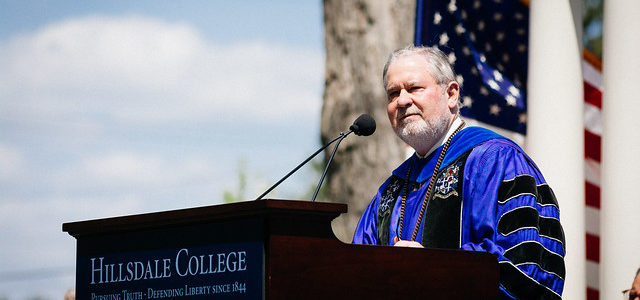
On Constitution Day Sept. 17, Hillsdale College announced the launch of its Steve and Amy Van Andel Graduate School of Government in Washington, D.C., to bring its distinctive form of robust, principled education to a new audience. The school is focused on working professionals in the government-dominated area of the country, and will offer a Master of Arts in Government, starting in January 2020.
Hillsdale College is an private college located two hours southwest of Detroit in southern Michigan. Founded in 1844 by abolitionists known as Freewill Baptists, the college has risen to prominence for its classical liberal arts approach to higher education and its emphasis on the Western philosophical and theological canon.
In addition to its rich curriculum, Hillsdale refuses to accept taxpayer subsidies, even indirectly via student government loans. The Hillsdale community has made a powerful commitment to advocating on behalf of civil and religious liberty, and its various offerings, from free online classes dedicated to the Federalist Papers to a monthly publication devoted to civic education, indicate.
When asked about why this program is unique from other available master’s programs in the D.C. area, Dr. Matthew Spalding, the graduate school’s dean, began by explaining the current landscape of master’s programs around the capitol, a majority of which seem devoted to teaching how to maintain our current political system, for better or for worse.
“Master’s degrees in Washington, D.C. seem to be about a dime-a-dozen,” he said. “There are lots of them, there are lots of choices, and everybody has one. The dominant theme of almost all of them is how to accommodate yourself to the status quo—how the government currently works, the bureaucracy, the administrative state.”
Yet, Spalding says, the Hillsdale mission is entirely distinct from that of its competitors: “We think we’ve got…a niche that is completely unfilled, which is a degree program that teaches people how to think, focusing on old books and statesman and history, so that one could learn how to make prudential decisions and be actively engaged in political life.”
Spalding explained that, similar to Hillsdale College’s approach to undergraduate studies, the graduate program’s curriculum will teach “certain fundamentals you need to know about the nature of things.” The program contains three “cores” upon which the curriculum is centered: political thought and culture, American politics, and statecraft. Spalding envisions the three cores as offering graduate students the structure and depth typically lacking in master’s programs, which tend to resemble “smorgasbords” of courses.
The program’s core courses, through an interdisciplinary approach, will explore not only the what of the American political system but also the why. Subject matter for the courses will be culled from not only traditional political sources, but also from important literary works, such as those by Shakespeare. Spalding underscored these alternative sources as powerful works that will allow students “deal with the questions of nature.”
The curriculum will offer courses on individual statesmen, such as Winston Churchill and Abraham Lincoln, the theory being that one of the best ways to understand statecraft is to study those who have already considered its key principles. Courses will range from the rise of the discord that led to Lincoln to the growth of Progressivism and the crisis of the administrative state.
Professors will include a long list of talented scholars from both the DC Hillsdale community as well as from Hillsdale’s main campus, including Spalding, Michael Anton, Dr. Matthew Mehan, Dr. Ronald Pestritto, Dr. Paul Rahe, and even Hillsdale College President Dr. Larry P. Arnn. Adjunct scholars and other specialists will also teach.
The classes will be offered in the evenings and geared towards working professionals. Many classes will be standard three-credit courses, but the school will also offer one-credit, intensives. The smaller-credit courses are designed to allow for students to engage more deeply with one specific topic over a series of several days, a feature Spalding felt made the curriculum even more distinct.
The Steve and Amy Van Andel Graduate School of Government offers an approach to the study of government that is a much-needed breath of fresh air. In a sea of master’s programs devoted to the upkeep of the status quo, Hillsdale hopes to cultivate a community of political thinkers whose ingenuity is only deepened by a profound understanding of America’s Founding.
The program will provide a haven of intense political reflection at a time politics have become ever more reductionist. As Winston Churchill used to say, “It is wonderful what great strides can be made when there is a resolute purpose behind them.” In the case of Hillsdale’s newest program, such a statement could not seem more prophetic.









